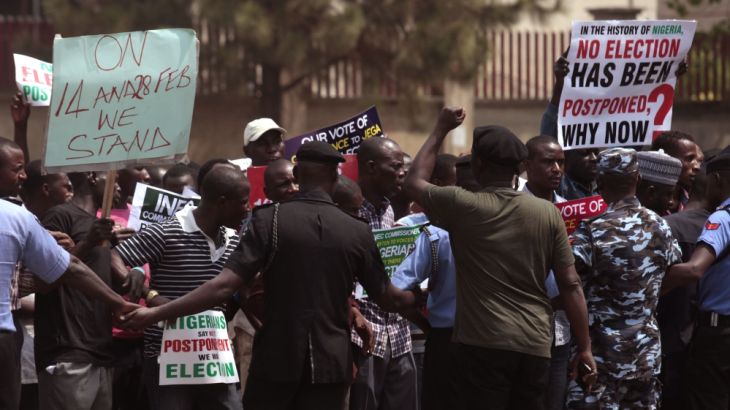Nigeria vote delay upsets locals in Boko Haram areas
Borno state residents express their disappointment after six-week postponement as protesters gather in Abuja.

Residents and officials in Nigeria’s northern Borno state have expressed their disappointment after the electoral commission announced it would postpone elections until March 28, six weeks later than planned.
Attahiru Jega, the chairman of the Independent National Electoral Commission (INEC), said late on Saturday that security chiefs advised a postponement as troops would not be available because of operations against the armed group in the north – especially in Borno state.
Keep reading
list of 4 itemsTen years after ‘Bring Back Our Girls,’ Nigeria’s kidnappings continue
Why mass kidnappings still plague Nigeria a decade after Chibok abductions
Children kidnapped in northern Nigeria have been freed
“If the security of personnel, voters, election observers and election material cannot be guaranteed, the lives of innocent young men and women and the prospect of free, fair and credible elections will be greatly jeopardised,” Jega said.
But residents and officials in Borno state told Al Jazeera they believed the elections should have gone ahead as planned on February 14.
RELATED: The regional response to the Baga massacre
“The mood here is that of huge disappointment – people were actually ready for the elections here,” said Al Jazeera’s Ahmed Idris, reporting from Maiduguri.
“The deputy governor of Borno state … said they were ready and this is a huge blow to their plans.”
Our correspondent added that a lot of people who have been displaced by fighting in the region had already been given their voting cards by election commission officials.
The decision to postpone the vote came following a closed-door meeting in Abuja between INEC, the ruling People’s Democratic Party (PDP), its main contender, the All Progressive Congress (APC), and other opposition parties.
Postponement disputed
Officials in President Goodluck Jonathan’s administration have been calling for a postponement amid continuing violence as the country battles Boko Haram.
Nigeria's security services have failed to defeat Boko Haram in five years. Some are asking how will they do it in six weeks, and whether there is another motive behind the delay.
However, civil rights groups, opposition political parties, and Western countries opposed a later election date.
Protesters had gathered outside the electoral commission headquarters in the capital, Abuja, for days, calling for elections to go ahead as planned.
“Civil society organisations are calling for the resignation of the election chair and Nigeria’s security chiefs over the postponement of the election, but that is unlikely to happen,” said Al Jazeera’s Yvonne Ndege, reporting from the city.
“Nigeria’s security services have failed to defeat Boko Haram in five years. Some are asking how will they do it in six weeks, and whether there is another motive behind the delay.”
The incumbent has been locked in a tight race with former military ruler Muhammadu Buhari of the APC.
APC national chairman John Odigie-Oyegun called the delay “a major setback for Nigerian democracy” and “highly provocative”.
But he added: “I strongly appeal to all Nigerians to remain calm and desist from violence and any activity which will compound this unfortunate development.”
The decision to postpone the election also drew condemnation from the United States, which said it was “deeply disappointed” by the delay.
In a statement, US Secretary of State John Kerry warned the Nigerian government against using “security concerns as a pretext for impeding the democratic process”.
Security boosted
Nigeria and its four neighbouring nations on Saturday pledged to deploy 8,700 troops, police and civilians as part of a regional effort to fight Boko Haram.
“The representatives of Benin, Cameroon, Niger, Nigeria and Chad have announced contributions totalling 8,700 military personnel, police and civilians,” the countries said in a statement after a meeting in Cameroon’s capital Yaounde.
INTERACTIVE: Boko Haram’s bloody legacy
Boko Haram’s attacks have increasingly spilled over from Nigeria into neighbouring nations.
Their first major assault in Niger on Friday triggered a forceful response from Chadian and Nigerien troops.
Niger’s defence minister reported that 109 fighters were killed in the fighting, along with four soldiers and a civilian. Seventeen other troops were wounded.
Chad already has troops fighting Boko Haram on two fronts, with soldiers deployed in Niger and Nigeria.